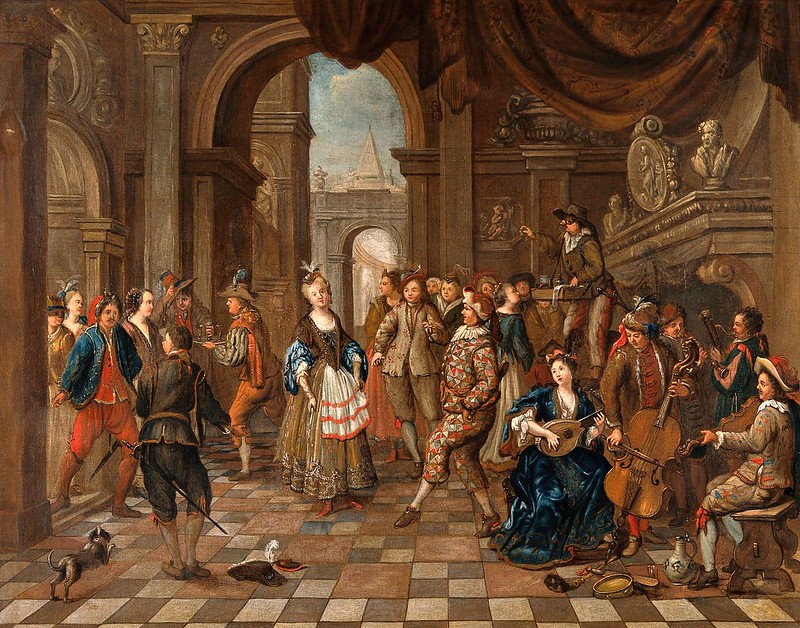Tomaso Albinoni (1671-1751)
- Concerto (III) a cinque in Fa maggiore, Opera Nona (1722)
Performers: Zеfіro ensemble
Painting: Hendrick Goovaerts (1669-1720) - A party with music and actors entertaining the company (c.1710)
---
Italian composer. His father, Antonio Albinoni, was a stationer and
manufacturer of playing cards who owned several shops in Venice and some
landed property. As well as completing his apprenticeship as a
stationer, Tomaso, the eldest son, learnt the violin and took singing
lessons; his teachers are not known. Despite his talent he was not
tempted on reaching adulthood to seek a post in church or court,
preferring to remain a dilettante – a man of independent means who
delighted himself (and others) through music. As a composer he first had
an unsuccessful flirtation with church music. A mass for three
unaccompanied male voices is the sole survivor of this episode; juvenile
infelicities abound, yet it clearly shows his penchant for contrapuntal
pattern-weaving. In 1694 Albinoni had two successes in fields for which
his musical training had probably better prepared him: an opera
(Zenobia, regina de' Palmireni) was staged at the Teatro di SS Giovanni e
Paolo at the beginning of 1694, and his op.1, 12 trio sonatas, was
published by Sala. Instrumental ensemble music (sonatas and concertos)
and secular vocal music (operas and solo cantatas) were to be his two
areas of activity in a remarkably long career as a composer which
terminated 47 years later with a prematurely entitled ‘oeuvre posthume’
(six violin sonatas, c.1740) and the opera Artamene (1741). It has been
suggested that Albinoni briefly served Ferdinando Carlo di Gonzaga, Duke
of Mantua, as a chamber musician immediately before 1700, but the only
biographical evidence is Albinoni's description of himself on the
title-page of his Sinfonie e concerti a cinque op.2 (1700) as ‘servo’ of
the duke, the work's dedicatee. Albinoni more probably used the word
for an honorary or even merely idealized attachment; he may have met
Ferdinando Carlo on one of the duke's frequent visits to the Venetian
opera houses. Albinoni's theatrical works soon began to be staged in
other Italian cities, the first being Rodrigo in Algeri (Naples, 1702).
He visited Florence to direct performances, as leader of the orchestra,
of a new opera, Griselda, in 1703, and may have stayed there for a time,
as another opera, Aminta, followed later in the year. In 1705 Albinoni
married in Milan the operatic soprano Margherita Raimondi. In 1699, when
she was about 15, she had appeared in Draghi's Amor per vita at S
Salvatore, Venice. After her marriage she continued to appear
intermittently on the stage (despite raising six children) and travelled
as far as Munich, where she sang in Torri's Lucio Vero in 1720. She
died in 1721. In 1709 Antonio Albinoni died. Under the terms of his will
(1705), Tomaso inherited a token share of the family business (one
shop), the principal management being left to two younger brothers, who
had to give him a third of the revenue. This renunciation of an elder
son's normal rights and responsibilities reflects Tomaso's total
commitment to music by this date. From c.1710 Albinoni styled himself
‘musico di violino’, as if to emphasize his independence. In 1722
Albinoni's career reached its zenith. He had just composed a set of 12
concertos – his most imposing to date – and had dedicated them to the
Elector of Bavaria, Maximilian II Emanuel. Now he was invited to Munich
to superintend performances of his opera I veri amici and a smaller
stage work, Il trionfo d'amore, both in celebration of the marriage of
Karl Albrecht, the electoral prince, to Maria Amalia, younger daughter
of the late Emperor Joseph I. From the 1720s Albinoni's operas were
frequently performed outside Italy, though in many cases they were
adapted or supplemented to suit local needs. Pimpinone, a set of comic
intermezzos which had originally appeared with Astarto in 1708, was
especially popular. However, Albinoni gradually composed fewer new works
in both operatic and instrumental fields. He seems to have retired
after 1741. His death notice dated 17 January 1751.

Cap comentari:
Publica un comentari a l'entrada